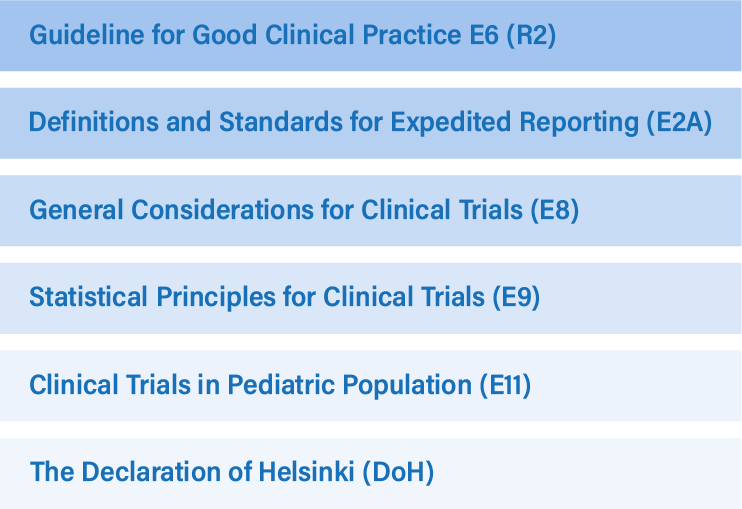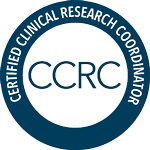The Association of Clinical Research Professionals
CCRC Certification

Eligibility

Clinical research professional with 3,000 hours of verifiable work experience are eligible to sit for the CCRC® Exam. Complete eligibility criteria is defined in the Academy’s policy manual.
What Qualifies as Work Experience?
-
Work related to human subject research
-
Paid contractual agreement – employer/employee
-
Can be verified by ACRP through employer
What is Excluded from Work Experience?
-
Any work that is part of a degree track or education program
-
Any experience older than ten years
-
Internships paid or unpaid

Clinical research professionals with 1,500 hours of verifiable work experience and a clinical research degree are eligible to site for the CCRC® Exam.
What Qualifies as a Clinical Research Degree?
-
Any degree awarded in clinical research from a CHEA accredited institution
-
Major in clinical research
What Does Not Qualify?
-
Any degree not in clinical research (biology, psychology, public health, epidemiology, nursing, doctorate)
-
Graduate certificate programs
Exam Content

The CCRC® exam consists of 125 multiple choice questions that must be answered within 180 minutes.
The exam is referenced only to the International Conference on Harmonization (ICH) Guidelines. No other regulatory framework is tested, including country-specific regulations (i.e, FDA or EMA).
The following are the only references for which the CCRC® Certification exam content can be supported:
-
CCRC® Exam Detailed Content Outline >
-
Guideline for Good Clinical Practice E6 (R2) >
-
Definitions and Standards for Expedited Reporting (E2A) >
-
General Considerations for Clinical Trials (E8) >
-
Statistical Principles for Clinical Trials (E9) >
-
Clinical Trials in Pediatric Population (E11) >
-
The Declaration of Helsinki (DoH) >
The Global CCRC® Exam Committee uses psychometrically sound practices to develop Certified Clinical Research Coordinator (CCRC) examinations that meet the current test specifications as determined by the most recent Job Task Analysis (JTA).

How to Apply

Review the Detailed Content Outline and make sure your experience and work hours are appropriate, as outlined in the Eligibility tab.
We also strongly encourage you to review the entire ACRP Certification Handbook, which provides full details about every facet of ACRP Certification.

Create a free ACRP account so you can begin the application process. Follow the on-screen prompts to enter any requested information and documentation.
If you already have an ACRP account, please proceed to step three.
Create Account >

You’re almost there! Please note, applications selected for audit will undergo a formal review by ACRP’s subject matter experts. In most instances, you will receive a status update about your application within 7 business days.
In accordance with the Americans with Disabilities Act, ACRP will provide reasonable accommodations for candidates with disabilities. Please complete this special accommodations form for submission with your application before proceeding.
Scheduling & Testing
ACRP’s testing partner PSI offers in-person testing, as well as on-demand remote testing available 24 hours a day, every day, during the testing windows.
Watch these videos to learn what to expect from each option before scheduling your exam.
Preparing to Test

The best way to prepare for the CCRC® exam is to fully understand the scope of the exam content and its references.
Please be sure to thoroughly review the following:
-
CCRC® Exam Detailed Content Outline >
-
Guideline for Good Clinical Practice E6 (R2) >
-
Definitions and Standards for Expedited Reporting (E2A) >
-
General Considerations for Clinical Trials (E8) >
-
Statistical Principles for Clinical Trials (E9) >
-
Clinical Trials in Pediatric Population (E11) >
-
The Declaration of Helsinki (DoH) >
-
ACRP Certification Handbook
REMEMBER: The exam is referenced only to the International Conference on Harmonization Guidelines. No other regulatory framework is tested, including country-specific regulations (i.e, FDA or EMA).

We also recommend leaning on your community! Thousands of ACRP Certified members have been in your shoes. They are active community members and always willing to share tips and advice for ACRP exam prep.
Visit the ACRP Community >

ACRP offers a variety of training and continuing education programs focused on the key ICH guidelines covered in the CCRC® exam.
Learn More >
After Your Exam

Exam results are shared immediately at the conclusion of your exam, but PSI will send you an email with your full score report within 24 hours.
Your ACRP account will reflect your results within 3 weeks of your exam date.

Congratulations! You just passed a major milestone on your professional journey and are now a member of the elite club of ACRP Certified clinical research professionals.
Keep an eye on your email because you will soon receive information from our digital badging partner Credly about claiming your digital badge and how you can use it to tout your accomplishment. Also learn how to use your new credential by reviewing the Certification Mark policy.
You have 2 years to keep your certification in good standing by continuing your professional development, and we’ll be right there with you every step of the way. In the meantime, we highly recommend you review all the details about Maintenance of Certification. Don’t leave it to the last minute!

 This trusted mark of excellence in clinical research is awarded to clinical researchers who have demonstrated proficiency of specific knowledge and skills by passing the standardized CCRC® Certification Exam.
This trusted mark of excellence in clinical research is awarded to clinical researchers who have demonstrated proficiency of specific knowledge and skills by passing the standardized CCRC® Certification Exam. 


